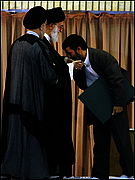Ahmadinejad Takes Complaint to Khamenei
» Management of Country in Crisis
As the struggle between the Majlis and the administration over the latter’s refusal to implement legislation passed by the parliament heightens, Mahmoud Ahmadinejad confirmed for the first time yesterday that the “differences are serious.” He also revealed that he had written a letter to ayatollah Khamenei to resolve some of the “problems” and that, in response, the leader of the Islamic regime had ordered the creation of a separation of powers workgroup to determine the “lines delineating the legislative and executive branches.”
The head of the administration, Mahmoud Ahmadinejad, made the announcement yesterday at the conclusion of a cabinet meeting where the recent differences between the Majlis and the administration were among the topics discussed. “The issues that are raised are not quarrels. The talk about taking away the authority of the president and giving it to someone else is just not possible. No one can violate the clear letter of the Constitution or dare to limit the supreme leader’s powers. The [Guardians) Council will not accept it and then they’ll take it to the [Expediency] Council. This is not legal.”
Referencing that others “say that this administration violates the law,” Ahmadinejad said, “It takes between 20 days to one month for legislation that comes out of the Majlis to reach the president’s desk. There was no problem with this in the past. Even though civil procedure laws had provided 5 days for this, everybody was patient and the government too took its time. But now they are demanding that this be done within five days. One must understand that this is not the president’s only job. He has thousands of tasks. The president is very busy. So what if it took a little longer than the five days, say seven days for the executive branch to issue the executive orders. Do we have to say that the administration is acting unlawfully?”
Ahmadinejad said that he had written about some of these differences to the supreme leader, and stressed that “the leader had written a letter to the Guardian Council asking it to establish a workgroup for this. The group is currently examining the issue and will send its opinion to the supreme leader who will determine lines between the executive and legislative.”
Mahmoud Ahmadinejad added, “These discussions are serious discussions and have posed problems for the country’s management, because it can’t be the case for the administration to take a decision based on its legal powers and for the work to be stopped by a Majlis bill.”
He concluded by saying that “these are serious issues and they have created problems in the management of the country because you cannot continue this situation where the government makes decisions, based on its authority, and then the Majlis stops it through legislature.”
In the past two months, differences between the Majlis and the administration over the announcement and implementation of laws have increased markedly.
In the latest instance, Majlis speaker Ali Larijani personally forwarded legislation to the country’s major newspapers for publication after Mahmoud Ahmadinejad failed to sign executive orders within the prescribed time limit.
Differences between the Majlis and the administration have existed over the last years, but they reached new levels last spring after a meeting between Mahmoud Ahmadinejad and members of Majlis’ Article 90 [of the constitution] committee. In that meeting, Ahmadinejad openly accused the Majlis of passing many bills (130 in total) that were “unconstitutional” or “un-Islamic” and announced that he would not implement them. Since then, things have only gotten worse between the two branches and the leader of each.


